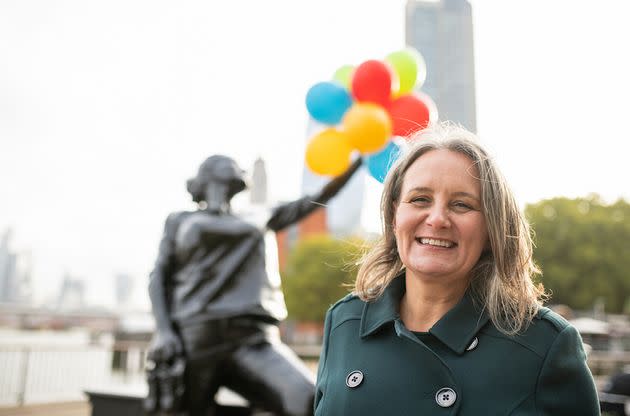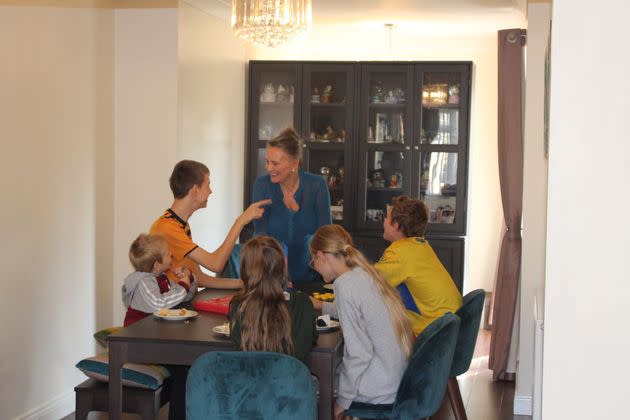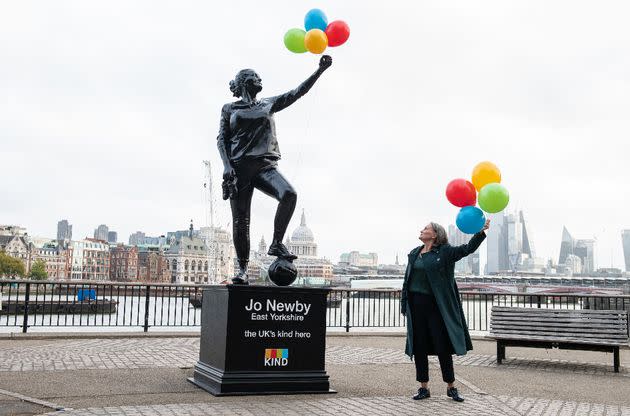'I've Fostered 92 Children, Here's What It's Taught Me About Raising Kids'

Jo was recently crowned the nation's kind hero.
In My Story, readers share their unique, life-changing experiences. Today, we hear from foster carer Jo Newby, 53, who is based in East Yorkshire.
I’ve always been around children. When I was young, I was the go-to babysitter locally, then I left school and went to work as a nursery nurse, and then I became a nanny. After that, I got married and had a child of my own (who’s 32 now).
I realised I wanted a massive family and to keep having children, but my first marriage didn’t last so I found myself as a lone parent for a number of years.
When my first child turned 10, I got married for the second time. We’d talked about having children, but thought we would rather give a home to displaced children. We didn’t need the children to be biologically ours, we just knew we wanted a happy, busy home.
We looked into fostering and discovered the process to be approved can take up to a year – it’s quite an in-depth check, and rightly so, because it carries a lot of responsibility taking care of someone else’s baby or child.
When you foster a child, a really complex amount of information is compiled about you and your family history, checks are done, and then you go to something called ‘panel’ (which is basically a panel of professionals who sift through all this information and sign you off).
Within a couple of days of panel I got a call to say our first child was arriving – this was 19 years ago. She was a really young baby, only a couple of months old. It was early evening and she arrived on the doorstep in a car seat.
It was quite overwhelming because, although we knew what we’d signed up for – we’d done all this training and had the cot, pram and everything – the fact someone brought this baby to our house and then just left her in our care, that was quite overwhelming.
It was like: ok, we are now responsible for this little human being.
We had her for a couple of months and then she was able to go home because her parent made successful changes to their lifestyle. But the parent didn’t sustain those changes so she then came back again and stayed with us until she was adopted at two years old. She’s almost 19 now and is still a part of our lives. She calls me ‘the fun aunt she didn’t realise she needed, but she got’.
Sometimes, years later, people will come back for advice or the children have questions about what they were like when they were little. No matter who the children end up with – whether it’s adopted parents, birth parents or extended family – we always stress to them that we would like that relationship to continue in whatever way, shape or form they feel able to do so.
We do get some of our older ones just pitching up on the doorstep and knocking on the door, saying: “Hi, we were just passing and thought we’d come and say hello.” That’s really nice they feel comfortable enough to do that.

Jo Newby with some of her foster children.
We’ve adopted one of our foster children Kasper, so we’ve made a long-term commitment to him. But mostly we tend to do short-term and emergency fostering. Lots of people think short-term care is a few weeks or months, but it can run into years.
We never put a finishing date on it. We have two little ones right now and we haven’t thought: ‘They’ll be with us for a year, or three months’. We’ve taken them and they’re here for as long as they need to be here.
When the children do leave, some of them will come back just for a day, or a weekend, to have a break from wherever they’re living. We’ll be here for as long as they need us to be. Much in the same way you make a commitment to your birth children that you’ll support them throughout their childhood, I’ve made that commitment to all my foster children.
One of the lessons I’ve learned through fostering is that when you parent your own children you have these really high expectations – and I don’t have any expectations now, of anybody, because somebody can only do what they can do.
If you’ve come from a traumatic start and, as a foster carer, I have expectations on you that maybe I would’ve had on my birth children, that’s going to be unrealistic. So I take everyone at face value. For some people, success looks really different. Good behaviour, if you want to call it that, can look really different. To just get someone to sit at a table may be a massive win.
I’ve also learned that as a foster carer you need to be consistent and reliable. Children absolutely thrive on routine and I’ve seen that in reality. Children can come from chaotic surroundings, but when they realise the environment is predictable and you’re predictable, calm, reliable and you keep your promises, that’s a really big thing to them as they can build trust.
You don’t go into fostering lightly. It’s not something you do flying by the seat of your pants. It’s not just pram-pushing and cooking the tea.
You don’t go into fostering lightly. It’s not something you do flying by the seat of your pants. It’s not just pram-pushing and cooking the tea. You need to be constantly training and learning and adapting your practice to meet the needs of the children. So if someone comes in with a specific medical condition, I’ll go off and research it, I’ll see if there’s any training courses locally, I’ll see if the hospital or doctors offer any classes around that medical condition.
I take children from 0-18 years old, so to meet the needs of everybody, my place is in the home – and I get so much out of that. A big part of fostering is preparing these children, no matter how old they are, for the real world: so that means teaching them life skills and encouraging them to be part of running the house.
We’ll be cooking dinner, setting the table and dishing up together, and then we load the dishwasher together. It helps them settle in, it helps build a bond, it teaches them responsibility and, for me, it makes them part of the family. Because I enjoy my role as a caregiver, as a housewife and mum so much, I don’t feel like I would be giving everything to this role if I had a job outside the home.

Jo Newby pictured with a statue of herself after being crowned the UK's kind hero.
And because Christopher (my husband) works, we’re lucky enough that we don’t rely on that fostering income, which isn’t income anyway to be honest: fostering money is an allowance you’re paid to feed, clothe and meet the expenses of the child. It’s not a wage for a foster carer, which I think a lot of people are under the impression it is.
If you’re thinking of becoming a foster carer, I would say: do your homework very carefully. Talk to existing foster carers, look at different agencies, the local authority.
Even if you’ve raised your own children, raising a child that’s come from trauma or chaos is very different. It takes a lot more than having a big heart and a spare bedroom, you’re all sorts of things to these children: you’re a counsellor, police woman, you’re so many different things to them. The whole world is a more complex place and our children are more complex too.
It takes a lot more than having a big heart and a spare bedroom, you’re all sorts of things to these children: you’re a counsellor, police woman, you’re so many different things.
Three weeks ago, KIND Snacks unveiled a statue of me on the pavements of London’s iconic Southbank after my husband nominated me as “the nation’s kindest resident”. I was humbled, I was in disbelief, I was a bit embarrassed. I’m still waiting for someone to tell me they’ve made a mistake.
I’ve never necessarily felt like I was doing anything over and above. I always felt that a little part of what I do was meeting my needs. So it feels a bit fraudulent that Christopher has put me forward for this. I’m just the average Joe getting up everyday, just doing what I do.
I didn’t really think about the wider impact of changing the cycle for some of those young people who’ve come into the care system and have a positive experience and are able to then move on in their own lives and give their own children a positive upbringing.
You don’t think about it in that wider frame until someone says: look at the impact you’ve had.
All I hope is that other foster carers see this as a recognition of the role itself – of our role. Not just of me as a person, but of the foster caring role in general. It’s a shoutout to every foster carer because we really are undervalued.
People don’t realise the enormity of the responsibility, the enormity of the commitment and the enormity of the impact you have on the children you’re caring for. You do something wrong and it will leave a mark, but if you do things right, that will leave a really positive impression.
Jo’s story came to light following KIND Snacks’ nationwide search for the UK’s kind hero earlier this year. Her statue has been unveiled with the hope of inspiring more acts of kindness, be they big or small.
She was interviewed by Natasha Hinde and her answers were edited for length and clarity. To take part in HuffPost UK’s My Story series, email uklife@huffpost.com.
Related...
Foster Carers Share What They Really Think Of This Year's John Lewis Advert
This Mum Wants You To Stop Teaching 'Stranger Danger' (And She Might Have A Point)
You Probably Don't Want To Know How Much It Now Costs To Raise A Child
This Martin Lewis Hack Helps Grandparents Make Money For Looking After Grandkids
Dear Parents, This Is Where Your Expensive Nursery Fees Are Going

